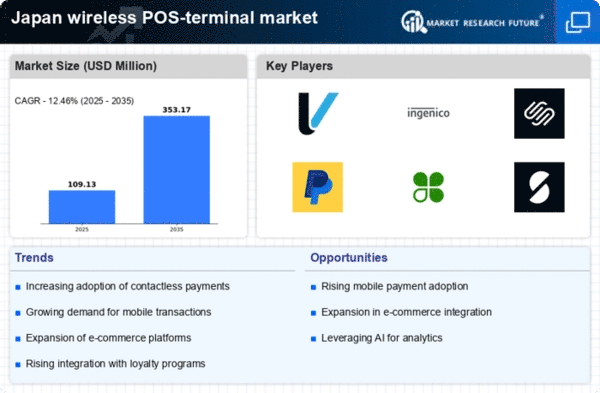Government Initiatives and Support
Government initiatives aimed at promoting digital payments are playing a crucial role in the growth of the wireless pos-terminal market in Japan. Policies encouraging cashless transactions and the development of a digital payment infrastructure are fostering an environment conducive to market expansion. The government has set ambitious targets to increase cashless transactions to 40% by 2025, which is likely to drive the adoption of wireless pos-terminals across various sectors. Additionally, subsidies and incentives for small and medium-sized enterprises (SMEs) to adopt digital payment solutions further stimulate market growth. These initiatives indicate a strong commitment to enhancing the payment ecosystem, thereby positively impacting the wireless pos-terminal market.
Growing E-commerce and Retail Sector
The expansion of the e-commerce and retail sector in Japan is significantly influencing the wireless pos-terminal market. With online shopping becoming increasingly popular, retailers are seeking to enhance their in-store payment solutions to provide a seamless omnichannel experience. In 2025, the retail sector is expected to contribute over ¥20 trillion to the economy, prompting businesses to adopt wireless pos-terminals that facilitate quick and efficient transactions. This shift not only caters to consumer preferences for convenience but also supports the need for contactless payment options. As a result, the wireless pos-terminal market is likely to benefit from the growing demand for integrated payment solutions that align with the evolving retail landscape.
Integration of Advanced Security Features
The integration of advanced security features is increasingly driving the wireless POS-terminal market in Japan. As cyber threats become more sophisticated, businesses are prioritizing secure payment solutions to protect customer data and build trust. The implementation of end-to-end encryption and tokenization in wireless pos-terminals is becoming standard practice. In 2025, it is estimated that around 60% of transactions will utilize these advanced security measures, reflecting a growing awareness of the importance of data protection. This focus on security not only mitigates risks but also enhances customer confidence in using wireless payment solutions. Thus, the integration of robust security features is a critical driver for the wireless pos-terminal market.
Consumer Preference for Convenience and Speed
Consumer behavior in Japan is increasingly leaning towards convenience and speed in payment methods, which is significantly impacting the wireless pos-terminal market. As consumers prioritize quick and efficient transactions, businesses are compelled to adopt wireless pos-terminals that facilitate such experiences. Surveys indicate that over 70% of consumers prefer contactless payment options, reflecting a shift in payment preferences. This trend is likely to continue, as consumers seek to minimize wait times and enhance their shopping experience. Consequently, the demand for wireless pos-terminals that offer rapid transaction capabilities is expected to rise, making consumer preferences a pivotal driver in the market.
Technological Advancements in Payment Solutions
The wireless POS-terminal market in Japan is surging due to rapid technological advancements in payment solutions. Innovations such as Near Field Communication (NFC) and Bluetooth Low Energy (BLE) are enhancing transaction efficiency and user experience. As of 2025, the market is projected to grow at a CAGR of approximately 15%, driven by the increasing adoption of these technologies. Retailers are increasingly investing in wireless pos-terminals to streamline operations and improve customer satisfaction. The integration of advanced features such as real-time analytics and inventory management further supports this growth. Consequently, businesses are likely to see improved operational efficiency and customer engagement, making technological advancements a key driver in the wireless pos-terminal market.
















